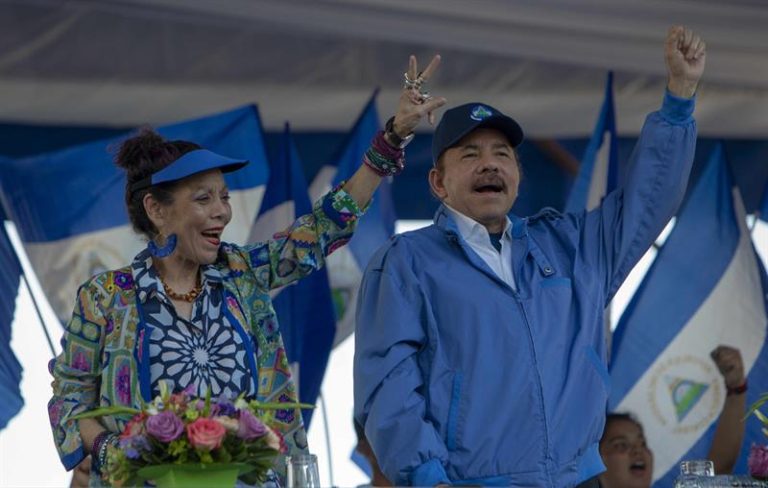8 de octubre 2019

Children of Exile: The Births “Sowing Hope” in the Camp of Nicaraguan Farmers

PUBLICIDAD 1M
PUBLICIDAD 4D
PUBLICIDAD 5D
“We are documenting, don’t believe that they are at all happy and calm enough to continue trying to harm the people,” warns Ortega

Dictator Daniel Ortega threatened to denounce his opponents before international justice and assured that they are already working on it.
Dictator Daniel Ortega threatened to denounce his opponents before international justice and assured that they are already working on it. “If there will be anyone taken to any International Criminal Court it is the criminals who promoted these crimes,” Ortega said. Then he emphasized: “We are already working, we are documenting, do not believe that they are at all happy and calm enough to continue trying to harm the people more,” he warned.
Ortega delivered his threat during the commemoration of the 140th anniversary of the birth of national hero Benjamin Zeledon. However, the State of Nicaragua has not ratified the Rome Statute, a constituent instrument of the International Criminal Court, so that the Nicaraguan dictator’s denunciation would have no place in that tribunal.
The president emphasized that they will strengthen the legal framework to “fight this battle” and hopes that “this will allow those Nicaraguans who are with these treasonous attitudes against their people, of betrayal to their homeland, to come to their senses.”
According to Ortega, opposition leaders who have traveled to the United States receive financing “that comes from the taxes of the American people,” all with the objective of participating in campaigns “to give the image of a country in which there is neither peace nor stability.”
During his rhetorical speech on the “Yankee occupation,” the dictator claimed: “We see the parade of traitors, how flights and financing are increasing so that they continue traveling to ask for aggression against the Nicaraguan people, and they are doing it calmly and they take photographs there with the representatives of the US Government and they insist on showing them here to boast that they are the ones chosen by the Yankee,” he said.
In late September, a delegation from the Civic Alliance for Justice and Democracy and the Blue and White National Unity traveled to Washington to meet with US congress people and members of the High-Level Commission on Nicaragua of the Organization of American States (OAS), which Ortega banned from entering the country in mid-September. The Commission seeks that the Ortega government resume the national dialogue in search for a peaceful solution to the Nicaraguan crisis.
On their tour to Washington, the opposition delegation also took the opportunity to demand specific sanctions against political operators of the dictatorship that act as accomplices of corruption and systematic violations against the human rights of Nicaraguans.
Ortega revealed his fear of the sanctions imposed by the United States against his regime and endorsed the words of the former Bishop of Leon, Simeon Pereira y Castillo (RIP), who in 1912 asked for “an understanding” between Nicaragua and the United States. “We tell the United States…in spite of everything that has happened, of all the damage they have caused, we still believe it is advantageous that there is an understanding between our homeland and the American nation, but that this is always based on equity and mutual interests,” underlined Ortega.
In addition, Ortega regretted that the bishops of the Episcopal Conference of Nicaragua are nothing at all like bishop Pereira y Castellon. “They could at least say we want peace, we do not want sanctions, the people suffer, no, nothing like that. At least when they put out their statements with the signatures of all of them, they never express it,” he complained. Last week, the bishops of the Episcopal Conference denounced the criminalization of the civic protest and persecution against the Catholic Church in Nicaragua.
“To protest—said the bishops in their message—has resulted in actions that threaten human life, restrict the freedoms of people and blind the knowledge of truth, of the facts and of our history since April 18, 2018.”
In mid-2019, the regime cancelled the national dialogue suspended since mid-May by the Civic Alliance, after the murder of the political prisoner Eddy Montes, in the La Modelo prison. The Ortega dictatorship also kept the negotiation bogged down with its lack of commitment to restore Nicaragua’s public liberties, while requesting that the opposition demand the cessation of sanctions against his Government.
Since the outbreak of the Nicaraguan crisis, which has left at least 328 confirmed dead, ten Ortega officials, including his wife and Vice President Rosario Murillo and his son Laureano Ortega Murillo, have been sanctioned by the Governments of the United States and Canada.
In her speech at the same event, Murillo also reiterated the anti-imperialist discourse and proclaimed a series of epithets against those who oppose her regime, in an effort to disqualify the claims for justice for more those murdered by the repression against the April Rebellion.
“I reiterate that traitors are pests and there they are, they are termites that reproduce, fungi, bacteria that reproduce,” Murillo said. After criticizing the opposition, the official wanted to show herself more secure and expressed: “We are sure that the paragraphs that will describe the circumstances and the moments that we have lived as a people in the forty years of revolution (fortieth anniversary of the triumph of the revolution), that these bright paragraphs will be retaken in the future as an example of the capacity for struggle and triumph, of bravery and of dignity,” she stressed.
Archivado como:
PUBLICIDAD 3M
Confidencial es un diario digital nicaragüense, de formato multimedia, fundado por Carlos F. Chamorro en junio de 1996.
PUBLICIDAD 3D